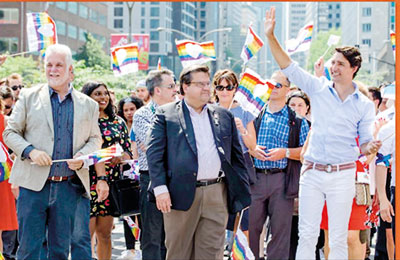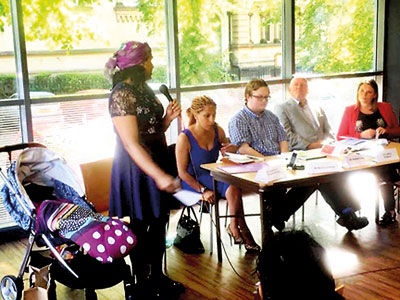Sunday Times 2
Transatlantic Pride and Sri Lankan internationalism
This year’s Pride festivities across the world have come to a conclusion. As a member of the LGBTQIA2S+ community, as a Trans woman of colour, I have always had a problematic relationship with Pride. As many other activists, artists, knowledge creators and thinkers in the worldwide Trans community have highlighted time and again, Pride is not a place that generally opens space for people of colour or for critical thought. Instead, it is a highly commercialised neoliberal venture, where big businesses come out to capitalise upon LGBTQIA2S+0 rights discourses. Pride events are also places where substantive racial hierarchies operate, where cisgender white gay men have priority, with groups such as Trans women of colour, differently-abled people, Indigenous people and many other groups being near-obliterated. Having lived and worked in several EU member states, this writer long had a policy of categorically boycotting Pride.
However, this year proved to be different.

This writer (second from left and partially covered), walking the Fierté Montréal/Canada Pride parade with Québec Premier Philippe Couillard, Montréal Mayor Denis Coderre and Prime Minister Justin Trudeau on August 20.
Pride of the Left?
As the LGBTQIA2S+ Officer of the Northern Ireland branch of the British Labour Party, this writer convened a 2017 Pride Committee, which prioritised an intersectional and inclusive approach as the key defining feature of our contributions to Belfast Pride 2017. This involved, first and foremost, raising awareness in our political circles within the left of the problems associated with a neoliberal, highly commercialised and market-oriented Pride celebration. Our focus, instead, was on the fact that Pride was originally a protest campaign, launched by Trans women of colour such as the late Marsha P Johnson and Sylvia Riviera. Pride is a struggle for equality, dignity and justice. Our objective was one of reviving this protesting and critical spirit of pride. This concept led to a signature pride event on 3rd August 2017, which brought together a cross-cutting dialogue. The event featured speakers from different backgrounds, Maria Lourenço, the first-ever black woman to stand for public office in Northern Ireland, Andrew Farley, a leading LGBTQIA2S rights activist, Jeffrey Dudgeon, a politician and senior-most community leader who took Northern Ireland to the European Court of Justice on the discrimination of LGBTQIA2S people, and Helena Wilson, a senior barrister specialising in LGBTQIA2S+ migration issues.
This writer drafted a 2017 Pride Leaflet entitled Pride 2017: A Dialogue of the Left, highlighting the key aspects of the contribution the left can and must make to discourses on Pride and LGBTQIA2S+ rights. This document highlighted the Labour Party’s commitment to fundamental rights and gender justice, also emphasising the key issues that come to light when ‘Pride’ is discussed from a perspective of the left. These involve engaging with the question of how austerity politics adversely affect LGBTQIA2S+ people, persistent challenges to LGBTQIA2S+ peoples’ reproductive rights, and glass ceilings that continue to prevent us from accessing positions of power and influence beyond the strictly defined sphere of LGBTQIA2S+ activism.
The content of this document, although specifically drafted for a UK (especially Northern Ireland) audience, hints at how the left could make a viable contribution to Pride, across the world. In the global South, what we observe too often is a reluctance on the part of the left to let go of their fair share of social conservatisms, patriarchal attitudes, [cis and trans] misogyny, homophobia and transphobia. A viable political movement (especially if it is one of the left) cannot be developed in the absence of a cogent discourse of inclusion of people irrespective of their ethnicity/ies, gender identity/ies, and intensely private matters such as sexual orientation/s.
Belfast Pride
Pride in Belfast, just like pride events elsewhere, seldom zooms in on intersectional issues, and is embedded in an ethic of commercialised and neoliberal LGBTQIA2S+ rights. In preparing UK Labour’s contingent at the Belfast Pride Parade, this writer, together with Labour’s Pride Committee, was determined to make a contribution that challenges the exclusionary practices of Pride. We ensured that our section of the parade included a front row composed of reproductive justice activists, women of colour and migrants with roots in the global South.
Visit of An Taoiseach Leo Varadkar TD
On the day of Pride Parade, a breakfast event for political parties and government bodies was organised, and the chief guest happened to be An Taoiseach Leo Varadkar TD, the first ever openly gay Prime Minister (Taoiseach) of Ireland. The visit of an Irish Prime Minister to Northern Ireland is always marked by much historic significance. After the Partition of Ireland, it took many decades for high-level interactions between the statelet of Northern Ireland and the Irish government in Dublin to take shape. It was only in the mid-1960s that An Taoiseach Séan Lemass and the then Northern Ireland Prime Minister Capt. Terence O’Neill exchanged visits to Belfast and Dublin respectively, marking an important historical precedent.
This year, the visit of Dr Varadkar on the day of the Pride Parade was evidence of a progressive turn in the politics of the island of Ireland. His visit was also highly significant to Northern Ireland, where the Democratic Unionist Party (DUP) is the largest political force. The DUP continues to be resolutely anti-reproductive justice and anti-LGBTQIA2S+ rights, thereby passing as one of the most reactionary political parties in present-day Western Europe. The DUP’s ongoing deal with the British Conservatives, which came to being after the Conservatives lost their parliamentary majority at the 2017 UK General Election, has reinforced its influence over the British polity. Dr Varadkar’s presence in Belfast on Pride Day 2017 sent strong message to the DUP, especially on the unsustainability of its intransigence on LGBTQIA2S rights.
The Transatlantic encounter:
Fierté Montréal
After the events in Belfast, this writer crossed the Atlantic to Montréal, where Montréal Pride, or Fierté Montréal, was under way in August 2017. Over a very long time, Fierté Montréal had been accused of exclusionary practices, where cis-white-gay men held a monopoly. This year, the organisers were determined to change their approach along a more inclusive and intersectional line. This involved giving centre-stage to LGBTQIA2S+ people of colour, migrant and differently-abled LGBTQIA2S+ people in all its events, and also organising an international francophone conference.

Dr Chamindra Weerawardhana (standing) presiding over the Pride Event of the Labour Party in Northern Ireland, Belfast, August 3.
This writer’s talk at the francophone conference involved a Transfeminist reading of politics of Queer Liberation, highlighting the importance of developing solidarities in the global South that goes beyond the remits of NGO-style LGBTQIA2S+ activism, and grounds Trans and Queer activism in specific local contexts. This critical rendering was preceded by an ‘intervention’ if not an act of protest, organised by a group of Trans women-of-colour activists, highlighting the denial of basic rights to Trans migrants in Québec. It is important to note that this protest took place at a high-profile event with VVIP presence, and the protest took place while the Québec Minister of Justice was present as the special invitee of a plenary event. Allowing this protest to go ahead, and providing a platform for critical voices such as that of this writer and other politically active Trans women marks a growing maturity of Fierté Montréal’s activism and advocacy, and suggests a reinforced sense of commitment to maintaining the ‘protest spirit’ of pride.
Montréal Pride Parade
The pride parade of Montréal included a substantial group of elected representatives from the Québec and Canadian federal governments, and Prime Minister Justin Trudeau himself. The Chief Guest, An Taoiseach Dr Leo Varadkar TD, happened to be the very first foreign head of government to walk in a pride parade in Canada. Representing the Labour Party and transnational LGBTQIA2S activist engagements, this writer joined the Pride Parade with the Canadian and Irish Prime Ministers, the Prime Minister of Québec, the lord mayor of Montréal, several cabinet ministers of the Trudeau government, MPs and local government representatives.
Epilogue: Towards Trans and Queer Liberation
The bottom line here is that a Sri Lankan Trans woman engages in activism and advocacy internationally gets to organise, intervene, and make her voice heard on either side of the Atlantic, but is still unlikely to be acknowledged, supported and given agency by the government of Sri Lanka and the island nation’s political establishment, which remain resolutely cis-normative, very largely heteronormative and socially conservative, throwing many people under the bus. LGBTQIA2S+ people in politics and government services are forced to hide their sexualities and gender identities in ‘fitting-in’ to this highly patriarchal, cis-normative and heteronormative mould.
Things do not need to be, and simply should not be that way.
Challenging the oppressive structures that rule over us requires concerted and critically-informed activism and advocacy, which goes way beyond NGO-centred LGBTQIA support work. Trans and Queer activism in many countries, especially in the global South, often takes a highly ‘apolitical’ turn, with a preference to avoiding divisive and politically contentious issues. Transfeminist politics are often misunderstood, even by apparently inclusive intersectional cis-feminists.
A few weeks ago, this writer learnt from a Sri Lankan Queer activist that there is a preference among some LGBTQIA2S+ organisations and individuals in the island to water down critical perspectives on Trans and Queer politics, the functional dynamics of organisations, strategic priorities and related issues. This lack of critical engagement on Trans and Queer politics is by far the biggest impediment to the consolidation of Trans and Queer Liberation, and to address immediate concerns such as repealing British legislation that bans non-heteronormative sexualities. The lack of a strong Trans/Queer political discourse is unhelpful in successfully facing the burgeoning challenges of bridging class, urban-rural and other gaps in the activist spectrum. The lack of a strong Queer political shield is such that, as pride celebrations come to an end worldwide, one Sri Lankan trans woman can write an account of a high-profile Transatlantic advocacy, while a transfeminine/gender-plural/fluid Sri Lankan is brutally murdered by a roadside in provincial Sri Lanka, simply for living their life.
The challenge at hand is one of life and death, of systemic violence and exclusion. A stronger brand of Queer politics that goes beyond NGO-centric activism is therefore an absolute imperative. In the absence of such a political agenda, the homophobic and transphobic elements in the polity will continue to thrive, and even otherwise progressive and educated politicians and political analysts are very likely to continue their current stance of perceiving casual transphobia and homophobia as acceptable, if not politically advantageous.
This does not, however, in any way imply a downgrading of the commitment of Sri Lankan activists to LGBTQIA2S+ rights. This critique does not involve a questioning, in any shape or form, of the tremendous contributions that activists in many organisations, collectives and groups have made to the Sri Lankan LGBTQIA2S+ community over the years. Instead, the point raised here is that of the necessity of complementing existing work with critical, and in some cases counter-intuitive perspectives on Trans and Queer politics, and specific intersectional issues that concern the local context. This also involves stretching international engagements beyond NGO-industrial links, especially to other places in the global South with shared challenges. It is through a political agenda of this nature that some form of (albeit parsimonious) justice could be rendered to the precious life we lost, and the violence they suffered while alive and in death (in the form of mis-gendering, dead-naming, infringement of privacy, trans/queerphobic and unethical media conduct, to name but a few).
Our collective liberation is not one that will be handed to us on a tray. It is one that needs to be fought for, vigorously, and consolidated.
(The writer is a gender justice activist working internationally, and is currently in charge of LGBTQIA2S advocacy in the UK Labour Party’s Northern Ireland branch.)

